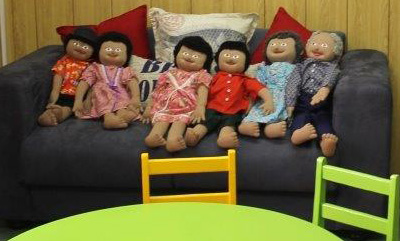Social Workers Critical Advocates for Swaziland’s Child Victims
Categories: Announcements
In many parts of the world, violence against children is a tragic reality. In Swaziland the statistics paint an especially sobering picture. Nearly one in three Swazi girls experiences sexual violence before the age of 18 and one in four suffer physical violence, according to a 2007 UNICEF national study on violence against children in Swaziland.
To help these young victims, the Government of the Kingdom of Swaziland has taken strong steps to support them by providing not only counseling and health services, but also special child-friendly courts (CFCs) to make it easier for them to testify against their attackers. Through the President’s Emergency Plan for AIDS Relief, the HFG project assisted with developing the country’s third CFC in Siteki, Lubombo and with training social workers to assist young victims.
Ms. Zee Catherine Masuku, MSW, HFG’s Regional Social Welfare Advisor in Swaziland, presented the major lessons learned from this effort at The Network for Social Work Management’s 26th Annual Management Conference at Howard University in Washington, D.C. on June 5, 2015.
With support from PEPFAR, the HFG project has trained 14 forensic social workers, 14 social workers on Child Protection Welfare Act, 10 prosecutors on legislation for using court intermediaries, and 15 prosecutors, 12 judicial officers, and 21 court intermediaries to understand respective roles and how better to work together for the child victims.
After a workshop, one magistrate said, “I came here thinking I know….this training has taught me that I don’t know anything.” And a prosecutor remarked, “What I have learnt in the past five days is that all I have been doing for the past 15 years was wrong.”
At the court’s opening in June, U.S. Ambassador Makila James stressed the critical role social workers place in the justice process, “Yet, while a nice building and furniture can help make children a little more comfortable in otherwise very difficult circumstances, what they need most of all is justice. They need passionate and adequately trained advocates – prosecutors, magistrates, court intermediaries, police and especially social workers. Social workers have a very important role in protecting children, as laid out in the Child Welfare and Protection Act, and you have some excellent and committed staff in the Department of Social Welfare here in Lubombo.”




